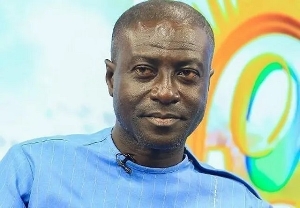- Home - News
- TWI News | TV
- Polls
- Year In Review
- News Archive
- Crime & Punishment
- Politics
- Regional
- Editorial
- Health
- Ghanaians Abroad
- Tabloid
- Africa
- Religion
- Election 2020
- Coronavirus
- News Videos | TV
- Photo Archives
- News Headlines
- Press Release
General News of Sunday, 22 September 2002
Source: Kyodo News
Ghanian in Hiroshima battles stereotype images
HIROSHIMA — As Christine Adu-Yeboah of Ghana is about to complete her two-year stint as a graduate student, she keenly feels that Japanese and Ghanians are separated by a wide gulf that is more emotional than geographic.
Adu-Yeboah, who is from the village of Akrokerri about five hours by car from the capital of Accra, has been studying at the graduate school of Hiroshima University since September 2000 on a study program though the Japan International Cooperation Agency (JICA).
The program was launched in 1974 to help engineers, specialists and administrators in developing countries study in Japan. About 218,000 people from more than 150 nations have studied in Japan through JICA so far. Since fiscal 1999, it has been offering assistance to people, including Adu-Yeboah, to stay in Japan for two years.
She is scheduled to return to Ghana in the autumn after finishing her master's degree in international cooperation.
During the summer Japanese Bon festival to welcome home the spirits of the dead, Adu-Yeboah took an ordinary slow train to visit her friend in Nagoya. She normally travels by ordinary train because the fare is much cheaper than that for express trains.
The train on her return trip was filled to capacity but en route back to Hiroshima, she managed to get a seat for two located by the door.
By the time the train reached past Osaka from Nagoya, it was overcrowded with passengers standing in the aisle. The seat next to her, however, remained empty. Some passengers glanced at the empty space and walked away.
An elderly woman with a little boy, probably her grandson, aged six or seven came on board. She let him sit next to Christine but he made a fuss saying "I am scared" and ran away.
"People in Ghana would be full of excitement out of curiosity if they see an Asian and would go all out to entertain that person, even at the expense of their family meal," a perplexed Christine said as she related her encounter with the boy.
The reluctance of some Japanese passengers to sit next to her, she said, may have been "discrimination against blacks but that was because they did not know Africa very well."
As her stay in Japan is drawing to a close, she has become keenly aware of the wide gulf between the two nations.
Japanese often her ask her in all seriousness if Ghanaians "live in the jungle" or whether there are "snakes" in Ghana, when she tells them she is from the West African country.
Adu-Yeboah, a 34-year-old school teacher who is also the mother of two children, feels they only see the worst sides of Africa as television typically shows Africans starving in famines or not wearing any clothes.
Cities in Ghana are the same as those in Japan with high-rise buildings and cars, she said, adding that Ghanaians conversely only think of Japan as a nation that just produces low-priced, quality electrical goods and precision instruments.
Her present headache is how to respond to requests from her family and relatives that she return home with personal computers and cameras.
She is also worried about the future of Japan. "Young people have gotten all they wanted," she said. "They don't need to use their brains to create new things. Japan is going to lose its past creativity and become empty 50 years from now."
She gave a lecture in English before middle school students in the western Japan city of Higashi Hiroshima in June explaining to them that Ghana exports cacao used to make cocoa and chocolates. She also told them about the Japanese scientist Dr Hideyo Noguchi, who died in her country in 1928 while carrying out research on yellow fever.
Later she asked the students what was Ghana's specialty product, but no one raised their hand. A student she picked out was apparently obliged to answer.
"All Japanese tend to stay in line with others and try not to stand out," she said. Citing the Japanese idiom "Those who push themselves forward will get a beating," she said she thinks Japan will not be able to nurture its "originality."
She promised the students she will introduce to them a Ghanaian middle school after her return home. She hopes the two schools will develop relations to the point of exchanging students in the future.
Adu-Yeboah has been wrestling with the subject of "teachers' in-service training" which she chose as the theme of her study at graduate school. She believes it will enhance the educational level in her country.
Yoshinori Tabata, a professor at the state-run Hiroshima University and her 55-year-old academic adviser, described her as a person "strong in her sense of mission for having been chosen (to study in Japan) and in her spirit to make her country better."
Adu-Yeboah said that because teachers' pay is low in Ghana almost all teachers aged 40 to 45 quit although their retirement age is 60, and use their retirement pay to open up businesses. Younger teachers also land better paid jobs at private sector firms such as mining companies.
It is hard to raise the level of education because of a lack of teachers capable of training younger teachers, she said.
She takes a look at a photograph of her family — her husband Christopher, 36, who returned to Ghana ahead of her, their 9-year-old son and 6-year-old daughter — every day, and looks forward to reuniting with them.
She keeps in touch with her husband, sending emails to a personal computer of a company that allows him to use it out of its own goodwill. He sends replies once a week.










